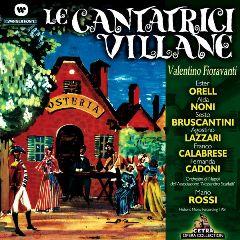Fioravanti - Le cantatrici villane (2004)
Fioravanti - Le cantatrici villane (2004)

1 Sinfonia (Le Cantatrici villane) 00:02:50 2 Che bel gusto e' in sul mattino 00:03:02 3 Cantiamo, è ver, tra noi ci divertiamo 00:02:24 4 Io dirò se nel gestire 00:03:30 5 Ah, questa mane la podagra mi punge 00:01:04 6 Oh, sospirate mura 00:02:31 7 Via, sopra andiam 00:02:10 8 Il flebile usignolo 00:02:26 9 Moglie ribalda, vedova si finge 00:01:32 10 Che fà il mio bene 00:01:33 11 E' permesso? 00:02:35 12 Qui dentro m'han detto 00:02:04 13 Morì la villanella 00:04:28 14 Voglio j a fa' 'na rivista a lo spartito 00:02:53 15 A noi, coraggio, olà, fuori la spada! 00:02:53 16 Io ti ho già scritturata 00:01:12 17 Principiammo, alò, la sinfonia! 00:03:11 18 Misera, dove son? 00:01:55 19 Ah, non son io che parlo 00:03:10 20 Oh, adesso canto io che son Onoria 00:01:11 21 Signori dell'orchestra trasite 00:03:01 Rosa - Alda Noni Agata - Ester Orell Giannetta - Fernanda Cadoni Don Bucefalo Zibaldone - Sesto Bruscantini Don Marco Bomba - Franco Calabrese Carlino - Agostino Lazzari Orchestra Alessandro Scarlatti di Napoli Conductor - Mario Rossi Rec.: 11/X-1951, Teatro di Palazzo Reale, Caserta
Valentino Fioravanti was born in Rome but studied in Naples and did much work in that city. Of his 70-odd operas, Le cantatrice villane (The Rustic Singers), a jolly tale of Rosa, Agata and Giannetta, three country wenches who aspire to be singers, a lecherous music master, Don Bucefalo and an equally unprincipled soldier and would-be singer, Don Marco, both with their sights on Rosa, and Carlino, Rosa’s husband who, believed dead, has come back to see what she’s getting up to, has occasionally been produced in modern times. Seemingly unaware of more complex operatic developments in Northern Europe, Fioravanti’s style, somewhere between Pergolesi and Cimarosa, is attractively melodious and sometimes resourceful within its limits.
At least two names will commend this reissue to opera buffs. Alda Noni had that type of pert-sounding vocal production with very brilliant vowels projected well forward (today a more rounded sound is preferred) which may sound dated, but may actually be necessary if the more virtuoso fioriture are to be brought off effortlessly. Sometimes this type of voice can be harsh, soubrette-like, but Noni’s gift was that she managed to keep her light, bright timbre sweet.
The other two ladies here are little remembered (Ester Orell cropped up in RAI productions over the next decade, not usually in leading roles) but they are very good and favour a similar type of voice production to Noni’s so they make a well-balanced, vivacious trio.
Not long ago I reviewed Sesto Bruscantini’s 1949 performance of Donizetti’s Il campanello and noted that his was a lighter baritone at that stage of his career than it later became, a fact confirmed here. As a vivacious character performance this is fine. Unfortunately he has to perform some spoken dialogue in Neapolitan dialect and, rather like a Londoner trying to put on a Glaswegian accent, if you can’t do it it’s better not to try. My wife (from Calabria and an enthusiast of Neapolitan theatre) has confirmed to me that he can’t, but even to my ears it wasn’t convincing. This is not going to worry most of the international public at whom the reissue is aimed, obviously.
Franco Calabrese, mostly remembered as an unfortunate Germont alongside Callas, is game enough for this sort of thing, as is Agostino Lazzari, a light tenor who appeared in countless RAI productions through to the 1960s.
The Naples "Alessandro Scarlatti" Orchestra was a chamber-sized band intended for the revival of this sort of repertoire, but it never drew upon the best of Italian players, sour wind intonation offsetting some good articulation by the strings. But Mario Rossi has a firm and lively hand, ensuring that the overall effect is greater than the sum of its parts. Nowadays we might expect a smaller group and a harpsichord continuo, and maybe authentic instruments too, but we might still be the losers if the conductor hadn’t Rossi’s sense of theatrical continuity.
The recording has some distortion in the louder passages but it is acceptable for its date. We get a useful note and a synopsis in English and Italian; as throughout this series, we get the libretto but in Italian only. We are told that the opera is given in a concert adaptation but I have no idea how much cutting this has entailed.
An interesting peep into Italian opera in the late 18th Century, and into the manner of its revival some fifty years ago. ---Christopher Howell, musicweb-international.com
download (mp3 @320 kbs):
yandex mediafire ulozto gett bayfiles








